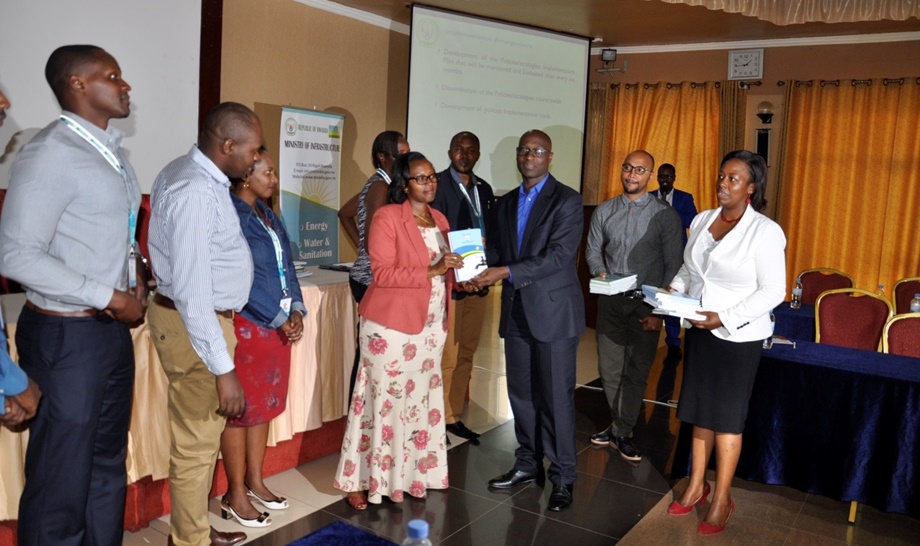Kigali, 13 June, 2017: The Ministry of Infrastructure conducted a one-day workshop which was the last stage of the dissemination of Water Supply and Sanitation Policies and their implementation strategies at provincial level and City of Kigali. The workshop brought together Officials from the City of Kigali and Districts; Sanitation and Hygiene Officers, Forest and Natural Resources Officers, District Environmental officers, District Health officers, Private Operators for water supply and sanitation services.
The new policies were drafted by the Ministry of Infrastructure (MININFRA) in line with both international and national Water and Sanitation Sector orientation under Sustainable Development Goals (SDGs), Rwanda’s Vision 2020, EDPRS2 and taking into consideration various institutional reforms. The target is to achieve universal access to clean water and sanitation services by 2020.
In his remarks, Eng. Aimé Muzola, the Head of Policy and Planning in the Ministry of Infrastructure, highlighted that elaboration of two distinct policies, National Water Supply Policy and Strategy as well as National Sanitation Policy and Strategy, will ensure smooth and faster implementation while the previous policy of 2010 combined both water and sanitation. “We want to put a particular emphasis on a broader scope of sanitation including individual sanitation; wastewater and solid waste management as well as urban storm water management”, Muzola said.
The New Policies have been developed in a series of cross-sectorial stakeholder consultations at different political and technical collaboration levels, including provinces and districts. He recognized the participation of the City of Kigali and Districts.
In her presentation, Eng. Marcelline Kayitesi, theWater and Sanitation Division Manager, highlighted a number of Policies objectives formulated and Strategic Actions to address current water and sanitation related challenges.
The National Water Supply Policy addresses the following key policy issues: (i) The remaining gap on access to clean water and the related funding gap for increasing access, particularly in unplanned and scattered settlements; (ii) Low level of sustainability of services and functionality of rural water systems; (iii) Depleting water resources resulting into high costs of service provision; Gap in human resource capacity in areas of planning, project management and operation and maintenance while the National Sanitation Policy, being an Umbrella Policy, addresses the following policy issues: (i) Missing improved sanitary facilities and limited service provision for excreta disposal, management of solid and wastewater combined with inadequate hygienic practices and storm water risks that hamper Rwanda’s economic growth and poverty reduction goals; (ii) The magnitude of the sanitation improvement agenda over the next years and the capacity constraints for scale-up the supply side; (iii) The resultant adverse sanitation related impacts for instance on urban storm water management; management of Industrial waste, E-waste; Healthcare waste and nuclear/radioactive waste that may constitute an increased danger for human health and environment if not in place.
The policy comes at the right time to address the issue. She noted the need to improve urban sanitation through provision of more sanitation infrastructure as well as ensuring safe, affordable and well – regulated sanitation services. She also noted the lack of proper collective sanitation system which remains a challenge to sanitation due to their high investment.
To ensure sustainable individual sanitation for all Rwandans, there is need to improve, replace and/or build about 500,000 improved on site sanitation (standard pit latrine) facilities every year to reach full coverage and improve hygienic behavior of the population by 2020 as stipulated in the new sanitation policy implementation strategy.
It is noted that the total funding of water supply policy implementation strategy is projected to Rwf337 billion to be used between 2015/16 up to 2020 while in sanitation, the Government plans to use over Rwf130.7 billion in infrastructure investments in a five-year period.
Government is engaging for more public-private partnership to help meet the targets and ease implementation of both policies. On the other hand, participants/stakeholders expressed their commitment to implement the new Policies by putting in place proper planning and implementation mechanisms and strategies.

 ENGL
ENGL KINY
KINY